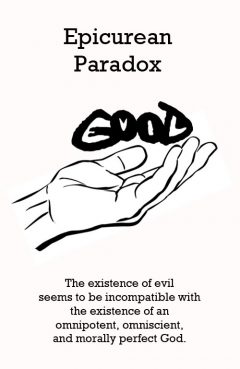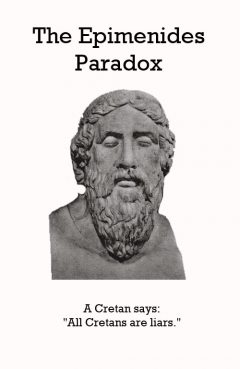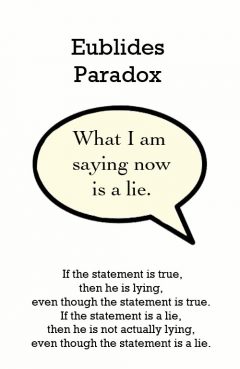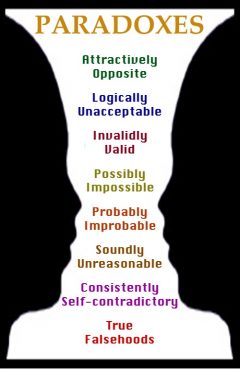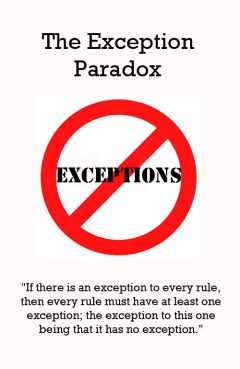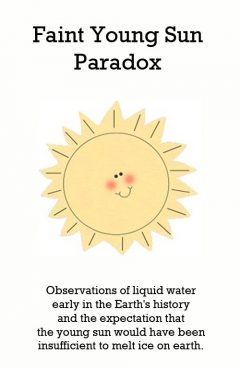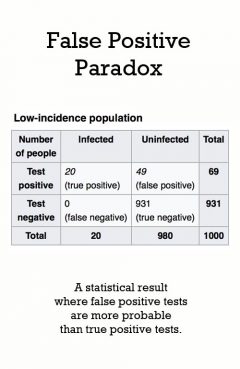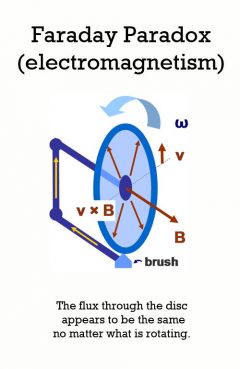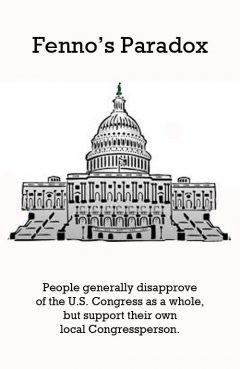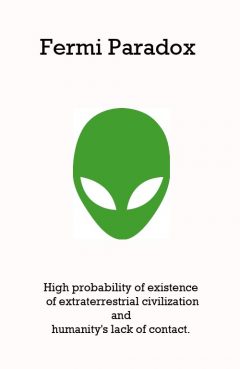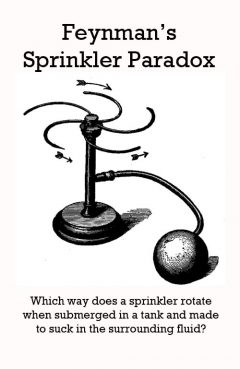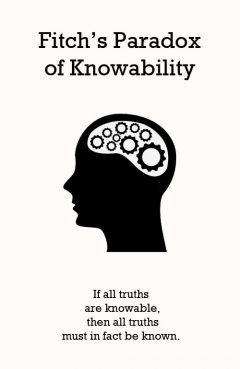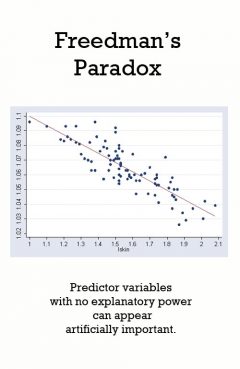Epicurean Paradox (Problem of Evil)
Release Date: //
Country of Release:
Length:
MPAA:
Medium: Paradox
Genre:
Release Message: The existence of evil seems to be incompatible with the existence of an omnipotent, omniscient, and morally perfect God. Authored by Epicurus.
Description: The existence of evil seems to be incompatible with the existence of an omnipotent, omniscient, and morally perfect God. God, he says, either wishes to take away evils, and is unable; or He is able, and is unwilling; or He is neither willing nor able, or He is both willing and able. If He is willing and is unable, He is feeble, which is not in accordance with the character of God; if He is able and unwilling, He is envious, which is equally at variance with God; if He is neither willing nor able, He is both envious and feeble, and therefore not God; if He is both willing and able, which alone is suitable to God, from what source then are evils? Or why does He not remove them?
The Epimenides Paradox
Release Date: //-600
Country of Release:
Length:
MPAA:
Medium: Paradox
Genre:
Release Message: A Cretan says: "All Cretans are liars". Authored by Epimenides.
Description: The Epimenides paradox reveals a problem with self-reference in logic. It is named after the Cretan philosopher Epimenides of Knossos (alive circa 600 BC) who is credited with the original statement. A typical description of the problem is given in the book G del, Escher, Bach, by Douglas Hofstadter Epimenides was a Cretan who made one immortal statement: "All Cretans are liars." A paradox of self-reference arises when one considers whether it is possible for Epimenides to have spoken the truth.
Eubulides Paradox
Release Date: //
Country of Release:
Length:
MPAA:
Medium: Paradox
Genre:
Release Message: A man says: "What I am saying now is a lie." If the statement is true, then he is lying, even though the statement is true. If the statement is a lie, then he is not actually lying, even though the statement is a lie. Thus, if the speaker is lying, he tells the truth, and vice versa. Authored by Eubulides.
Description: The Liar (pseudomenos) paradox: A man says: "What I am saying now is a lie." If the statement is true, then he is lying, even though the statement is true. If the statement is a lie, then he is not actually lying, even though the statement is a lie. Thus, if the speaker is lying, he tells the truth, and vice versa.
European Paradox
Release Date: //
Country of Release:
Length:
MPAA:
Medium: Paradox
Genre:
Release Message: The perceived failure of European countries to translate scientific advances into marketable innovations.
Description: The perceived failure of European countries to translate scientific advances into marketable innovations.
The Exception Paradox
Release Date: //
Country of Release:
Length:
MPAA:
Medium: Paradox
Genre:
Release Message: "If there is an exception to every rule, then every rule must have at least one exception; the exception to this one being that it has no exception."
Description: "If there is an exception to every rule, then every rule must have at least one exception; the exception to this one being that it has no exception." "There's always an exception to the rule, except to the exception of the rule, which is, in of itself, an accepted exception of the rule." ///// "In a world with no rules, there should be at least one rule - a rule against rules."
Extinction Paradox
Release Date: //
Country of Release:
Length:
MPAA:
Medium: Paradox
Genre:
Release Message: In the small wavelength limit, the total scattering cross section of an impenetrable sphere is twice its geometrical cross-sectional area (which is the value obtained in classical mechanics).
Description: In the small wavelength limit, the total scattering cross section of an impenetrable sphere is twice its geometrical cross-sectional area (which is the value obtained in classical mechanics).
Faint Young Sun Paradox
Release Date: //
Country of Release:
Length:
MPAA:
Medium: Paradox
Genre:
Release Message: The apparent contradiction between observations of liquid water early in the Earth's history and the astrophysical expectation that the output of the young sun would have been insufficient to melt ice on earth.
Description: The apparent contradiction between observations of liquid water early in the Earth's history and the astrophysical expectation that the output of the young sun would have been insufficient to melt ice on earth.
False Positive Paradox
Release Date: //
Country of Release:
Length:
MPAA:
Medium: Paradox
Genre:
Release Message: A statistical result where false positive tests are more probable than true positive tests.
Description: The false positive paradox is a statistical result where false positive tests are more probable than true positive tests, occurring when the overall population has a low incidence of a condition and the incidence rate is lower than the false positive rate. The probability of a positive test result is determined not only by the accuracy of the test but by the characteristics of the sampled population. When the incidence, the proportion of those who have a given condition, is lower than the test's false positive rate, even tests that have a very low chance of giving a false positive in an individual case will give more false than true positives overall. So, in a society with very few infected people, fewer proportionately than the test gives false positives, there will actually be more who test positive for a disease incorrectly and don't have it than those who test positive accurately and do. The paradox has surprised many.
Faraday Paradox (electrochemistry)
Release Date: //
Country of Release:
Length:
MPAA:
Medium: Paradox
Genre:
Release Message: An apparent violation of Faraday's law of electromagnetic induction.
Description: Diluted nitric acid will corrode steel, while concentrated nitric acid doesn't. A once inexplicable aspect of the reaction between nitric acid and steel. Around 1830, the English scientist Michael Faraday found that diluted nitric acid would attack steel, but concentrated nitric acid would not. The attempt to explain this discovery led to advances in electrochemistry. The key to resolving the paradox is passivation. When the acid is concentrated enough, and because concentrated nitric acid is an oxidizing agent, the potential of the metal is raised to the point that a layer of metastable Fe3O4 forms on the surface and protects it from further corrosion, even though the pH is so low that stable Fe3O4 cannot exist. This explanation is supported by the observation that scratching the surface causes a burst of bubbles. Diluted nitric acid is not as strong an oxidizing agent and hence does not raise the potential of the metal to the extent that metastable Fe3O4 forms on the surface. In this case, the metal freely corrodes.
Faraday Paradox (electromagnetism)
Release Date: //
Country of Release:
Length:
MPAA:
Medium: Paradox
Genre:
Release Message: The flux through the disc appears to be the same no matter what is rotating. Authored by Michael Faraday.
Description: The Faraday paradox or Faraday's paradox is any experiment in which Michael Faraday's law of electromagnetic induction appears to predict an incorrect result. The paradoxes fall into two classes: ´ Faraday's law appears to predict that there will be zero EMF but there is a non-zero EMF. ´ Faraday's law appears to predict that there will be a non-zero EMF but there is a zero EMF. Faraday deduced his law of induction in 1831, after inventing the first electromagnetic generator or dynamo, but was never satisfied with his own explanation of the paradox.
Fenno's Paradox
Release Date: //
Country of Release:
Length:
MPAA:
Medium: Paradox
Genre:
Release Message: The belief that people generally disapprove of the United States Congress as a whole, but support the Congressman from their own Congressional district. Authored by Richard Fenno.
Description: Fenno's Paradox is the belief that people generally disapprove of the United States Congress as a whole, but support the Congressmen from their own Congressional district. It is named after Richard Fenno who discussed this in his 1978 book Home Style: House Members in Their Districts.
Fermi Paradox
Release Date: //
Country of Release:
Length:
MPAA:
Medium: Paradox
Genre:
Release Message: If there are, as probability would suggest, many other sentient species in the Universe, then where are they? Shouldn't their presence be obvious? Authored by Enrico Fermi.
Description: The Fermi paradox (or Fermi's paradox) is the apparent contradiction between high estimates of the probability of the existence of extraterrestrial civilization and humanity's lack of contact with, or evidence for, such civilizations.[1] The basic points of the argument, made by physicists Enrico Fermi and Michael H. Hart, are: The Sun is a young star. There are billions of stars in the galaxy that are billions of years older; Some of these stars likely have Earth-like planets[2] which, if the Earth is typical, may develop intelligent life; Presumably some of these civilizations will develop interstellar travel, a technology Earth is investigating even now; At any practical pace of interstellar travel, the galaxy can be completely colonized in a few tens of millions of years.
Feynman Sprinkler (Feynman Paradox)
Release Date: //
Country of Release:
Length:
MPAA:
Medium: Paradox
Genre:
Release Message: Which way does a sprinkler rotate when submerged in a tank and made to suck in the surrounding fluid? Authored by Richard Phillips Feynman.
Description: Which way does a sprinkler rotate when submerged in a tank and made to suck in the surrounding fluid? also referred to as a Feynman inverse sprinkler or as a reverse sprinkler, is a sprinkler-like device which is submerged in a tank and made to suck in the surrounding fluid. The question of how such a device would turn was the subject of an intense and remarkably long-lived debate. A regular sprinkler has nozzles arranged at angles on a freely rotating wheel such that when water is pumped out of them, the resulting jets cause the wheel to rotate; both a Catherine wheel and the aeolipile ("Hero engine") work on the same principle. A "reverse" or "inverse" sprinkler would operate by aspirating the surrounding fluid instead. The problem is now commonly associated with theoretical physicist Richard Feynman, who mentions it in his popular autobiographical book Surely You're Joking, Mr. Feynman!. The problem did not originate with Feynman, nor did he publish a solution to it.
Fire Alarm Paradox
Fitch's Paradox of Knowability
Release Date: //
Country of Release:
Length:
MPAA:
Medium: Paradox
Genre:
Release Message: If all truths are knowable, then all truths must in fact be known. Authored by Frederic Brenton Fitch.
Description: Fitch's paradox of knowability is one of the fundamental puzzles of epistemic logic. It provides a challenge to the knowability thesis, which states that any truth is, in principle, knowable. The paradox is that this assumption implies the omniscience principle, which asserts that any truth is known. Essentially, Fitch's paradox asserts that the existence of an unknown truth is unknowable. So if all truths were knowable, it would follow that all truths are in fact known. The paradox is of concern for verificationist or anti-realist accounts of truth, for which the knowability thesis is very plausible, but the omniscience principle is very implausible. The paradox appeared as a minor theorem in a 1963 paper by Frederic Fitch, "A Logical Analysis of Some Value Concepts". Other than the knowability thesis, his proof makes only modest assumptions on the modal nature of knowledge and of possibility. He also generalized the proof to different modalities. It resurfaced in 1979 when W.D. Hart wrote that Fitch's proof was an "unjustly neglected logical gem".
Fluctuation Theorem
Freedman's Paradox
Release Date: //1983
Country of Release:
Length:
MPAA:
Medium: Paradox
Genre:
Release Message: It describes a problem in model selection where predictor variables with no explanatory power can appear artificially important. Authored by David A. Freedman.
Description: In statistical analysis, Freedman's paradox, named after David Freedman, describes a problem in model selection whereby predictor variables with no explanatory power can appear artificially important. Freedman demonstrated (through simulation and asymptotic calculation) that this is a common occurrence when the number of variables is similar to the number of data points. Recently, new information-theoretic estimators have been developed in an attempt to reduce this problem, in addition to the accompanying issue of model selection bias, whereby estimators of predictor variables that have a weak relationship with the response variable are biased.
French Paradox
Release Date: //
Country of Release:
Length:
MPAA:
Medium: Paradox
Genre:
Release Message: The observation that the French suffer a relatively low incidence of coronary heart disease, despite having a diet relatively rich in saturated fats.
Description: The term French paradox was coined by Serge Renaud, a scientist from Bordeaux University in France, and has been in use since the early 1990s. The French paradox is the catch phrase frequently used to summarize the apparently paradoxical epidemiological observation that French people have a relatively low incidence of coronary heart disease (CHD), despite having a diet relatively rich in saturated fats,[1] in apparent contradiction to the widely-held belief that the high consumption of such fats is a risk factor for CHD. The paradox is that if the thesis linking saturated fats to CHD is valid, the French ought to have a higher rate of CHD than comparable countries where the per capita consumption of such fats is lower. The French paradox implies two important possibilities. The first is that the hypothesis linking saturated fats to CHD is not completely valid (or, at the extreme, is entirely invalid). The second possibility is that the link between saturated fats and CHD is valid, but that some additional factor in the French diet or lifestyle mitigates this risk -- presumably with the implication that if this factor can be identified, it can be incorporated into the diet and lifestyle of other countries, with the same lifesaving implications observed in France. Both possibilities have generated considerable media interest, as well as some scientific research.
Friendship Paradox
Release Date: //1991
Country of Release:
Length:
MPAA:
Medium: Paradox
Genre:
Release Message: For almost everyone, their friends have more friends than they do. Authored by Scott L. Feld.
Description: The friendship paradox is the phenomenon first observed by the sociologist Scott L. Feld in 1991 that most people have fewer friends than their friends have, on average.[1] It can be explained as a form of sampling bias in which people with greater numbers of friends have an increased likelihood of being observed among one's own friends. In contradiction to this, most people believe that they have more friends than their friends have.[2] The same observation can be applied more generally to social networks defined by other relations than friendship: for instance, most people's sexual partners have had (on the average) a greater number of sexual partners than they have.[3][4]
Gabriel's Horn or Torricelli's Trumpet
Release Date: //
Country of Release:
Length:
MPAA:
Medium: Paradox
Genre:
Release Message: A geometric figure, which has infinite surface area but finite volume. Authored by Evangelista Torricelli.
Description: A simple object with finite volume but infinite surface area. Also, the Mandelbrot set and various other fractals are covered by a finite area, but have an infinite perimeter (in fact, there are no two distinct points on the boundary of the Mandelbrot set that can be reached from one another by moving a finite distance along that boundary, which also implies that in a sense you go no further if you walk "the wrong way" around the set to reach a nearby point). This can be represented by a Klein bottle.
